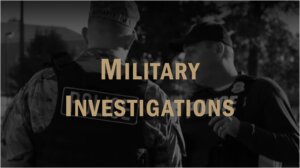What Is an AR 15-6 Investigation?
An Army Regulation (AR) 15-6 investigation is a type of administrative investigation authorized by military law and used by the U.S. Army to determine the facts and circumstances of an incident or allegation. Governed by Army Regulation 15-6, this process is essential for maintaining accountability and discipline within the ranks. Unlike a criminal investigation by law enforcement, the AR 15-6 process is not inherently punitive but can result in serious consequences such as adverse administrative action or referral for disciplinary proceedings under the Uniform Code of Military Justice (UCMJ).

These investigations are initiated to address a wide range of issues, including but not limited to allegations of misconduct within the DoD, violations of regulations, loss or misuse of government property, and complaints of sexual harassment. The process ensures that commanders have sufficient evidence to make informed decisions and take appropriate corrective action when necessary.
Who Conducts an AR 15-6 Investigation?
The appointing authority, often a commanding officer, selects the investigating officer. This officer may be a commissioned officer, warrant officer, or field grade officer with the appropriate rank and training. The selection depends on the complexity of the case and the level of the respondent involved. The investigating officer is tasked with maintaining impartiality while executing a thorough investigative plan.
The Role of the Investigating Officer
Under Army Regulation 15-6, the investigating officer is responsible for gathering and analyzing all relevant information. This includes collecting witness statements, physical evidence, and written or sworn statements. They may interview witnesses and the respondent, consult with a legal advisor to ensure proper legal review, and compile a detailed report of the investigation. The officer must adhere to the rules of evidence and provide rights advisement when necessary.
Types of AR 15-6 Investigations
There are two primary types of investigations:
- Informal Investigations: Typically used for less serious allegations, these do not require a formal hearing or board of officers. The investigating officer gathers information independently and submits findings to the appointing authority. This can sometimes be referred to as a commander’s inquiry.
- Formal Investigations: Used when serious allegations are involved, including criminal misconduct or high-profile incidents. These involve structured procedures, including boards of officers, rights advisement, and sometimes witness testimony.
Steps in the AR 15-6 Investigation Process
- Appointment
The appointing authority issues an official appointment memorandum that names the investigating officer (IO), outlines their duties and defines the scope of the inquiry per AR 15-6. - Planning
The IO reviews relevant regulations, outlines facts to verify, identifies witnesses and evidence, and establishes an investigative plan. - Evidence Collection
The IO collects documents, physical evidence, emails, adverse information, and other material, conducting interviews to obtain witness statements (written statements or sworn statements). - Rights Advisement
If the inquiry may lead to adverse actions, the respondent is advised of their rights, including the right to remain silent and consult with legal counsel. - Interviewing
Interviews are conducted professionally. The IO evaluates credibility, corroborates testimony, and ensures a balanced, unbiased record. - Report of Investigation (ROI)
The IO prepares a comprehensive report using DA forms, summarizing evidence, findings, and recommended actions. - Legal Review
A legal advisor examines the ROI for procedural compliance and legal sufficiency under Army Regulation 15-6. - Approval
The approval authority (e.g., the adjutant general) reviews and finalizes the report, authorizing any corrective or disciplinary action.
Rights of the Respondent
The respondent is the individual under investigation. They have specific rights, including the right to legal advice, to review and rebut adverse findings, and to submit additional evidence. Legal representation from a JAG or a civilian military defense attorney is crucial to protect these rights and prepare an effective rebuttal.
Possible Outcomes of an AR 15-6 Investigation
- No Action: No adverse result if evidence is insufficient or the subject is exonerated.
- Corrective Action: Includes counseling, retraining, or reassignment to correct deficiencies.
- Adverse Administrative Action: Formal reprimands, downgraded evaluations, or separation proceedings that impact career progression.
- Referral for UCMJ Action or Court-Martial: Misconduct cases may lead to non-judicial punishment or court-martial proceedings.
- Referral to Inspector General or Law Enforcement: For issues beyond the IO’s scope, the case may be escalated.
- Policy or Command Recommendations: Suggestions to address systemic or leadership issues within the chain of command.

Common Issues Investigated Under AR 15-6
- Sexual Harassment or Assault: Violations of Army policy or SHARP program standards.
- Misuse or Loss of Government Property: Allegations involving theft, damage, or mismanagement of Army assets.
- Regulatory Violations: Breaches of Army policy, orders, or standards of conduct.
- Command Climate Issues: Toxic leadership, abuse of authority, or poor morale.
- Training Accidents or Operational Incidents: Failures during exercises or missions.
- Criminal Misconduct: Fraud, assault, drug offenses, or other violations warranting legal review.
Why Legal Representation Matters
Being involved in an AR 15-6 investigation can have serious implications for your military career. An experienced military defense attorney can help you challenge the findings, prepare a comprehensive rebuttal, and ensure your rights are protected throughout the process. Whether you’re dealing with an adverse administrative action or facing potential court-martial, timely legal advice is essential.
Facing an AR 15-6 Investigation? Get Legal Help Now
If you’re the subject of an AR 15-6 investigation, protect your career and reputation by seeking qualified legal representation. The Military Defense Firm has extensive experience defending service members through every stage of the investigation process. We know how to navigate the complexities of Army Regulation 15-6 and fight back against adverse findings.
Contact us today to schedule your free consultation and get the support you need from a law office that understands military justice.


